A tempestuous image of the sea crashing onto the Giant’s causeway sets the scene, reminding us of the sirens of mythology singing seafarers to their death on the rocks. Tūranga’s Tautoru | TSB space backdrop shimmers with green and blue streamers. On the stage, a wooden coat stand, strung with four sets of wings. As a performance poetry event affiliated with National Poetry Day, it was no surprise to see some seasoned Canterbury poets among the crowd, including Bernadette Hall and Frankie McMillan. Clustered around tables and clutching our drinks, we await the Sirens.
The Sirens in question are Janet Wainscott, Marisa Cappetta, Jeni Curtis and Gail Ingram, in a debut performance at WORD directed by fellow poet-playwright Joanna Preston.
What follows is an hour of almost uninterrupted poetry. When one poet steps back, the next steps forward, each poem punctuated by the turning of a page of the large book. Naming the Sirens breaks the ever-evolving stereotypes of what a poetry event is. Taking turns to become a central speaker, the other three provided gestural and stylised movement-based emphasis during each poem. This “Greek chorus” sways side to side, stomps and points and crosses their arms and whispers, always complementing the spoken words. The poems have been selected in an order that forms a loose narrative arc, and a strong emotional progression. From a place of vulnerability grows a discovery and ownership of their own sexualities, and a confidence of their place in the world. Though never quite so linear, as we are always catching glimpses of a legacy that extends from the past.
This is a show that invites us into a world where women are birds, and are pecked by birds. There are fine bone needles and men made of cotton. There are swan maidens and hares, stone-age Denisovan girls and London flats. This is a show where you are told: “Do not listen to your mother too closely, she will always lie.”
Packed with literary references and women through the stories and the ages, from Judith to Joan of Arc, from Baba Yaga to Pandora, Jezebel to Ginevra, it is a blend of experiences from antiquity to #MeToo.
Yet always, there is a thread. One of the main themes of the performance was to highlight the ever-present artistry in women’s domain, something often relegated to the sidelines. It looks at exploring the power of imagining and of craft; of sewing your own wings. It aims to name the women through history that have been pushed to the sidelines, to voice their side of the story.
The Sirens have clearly paid attention to detail, each wearing items that relate to lines in their poetry. Gail, whose poem The Angel speaks of diaphanous dragonfly wings, wears a dragonfly pendant. Jeni, whose poem the stone men features Medusa, is wearing a t-shirt featuring a head turned to stone. Janet wears pearl earrings to complement her poem Pearls. Marisa wears her wedding ring so long the bone changes shape. In powerful get-ups of velvet dresses, stomping boots, red lipstick and red painted fingernails (aka talons), over the course of the show the Sirens are one-by-one endowed with their wings. By the end, they are fully-fledged and ready to fly.
There is true feeling in the poems. Gail Ingram’s On the tube was a particularly striking account of a sexual assault, descending into panic as the chorus pressed ever closer, until we could no longer see or hear her.
But like a phoenix from the ashes – “I stand unburned in the centre of the fire until it is ash” – each of the women stand firm. Gail’s next poem, B Movie, gives a saucy and double-entendre filled account of her meeting her husband, which tickled more than a few chuckles from the audience.
In contrast with Janet’s line from the beginning “she continues without a narrative arc […] without resolution,” this is a show with performers that have settled comfortably into themselves.
Naming the Sirens asks many questions of its audience, questions that are asked of and by women. It wants to know what we might leave behind, why “I devour pomegranates but bear no fruit of my own.” It asks “What’s the point of all that beauty if you end up only known as a chain of jewellery stores?” It dissects the roles of women through the ages – the innocent girl, the wife, the mother, the crone – and to each one it grants agency. It probes and owns what choices we make about our lives. An audience member commented that they’d “never seen anything like it.”
All four Sirens have new poetry collections published this year by Sudden Valley Press, and all poems in Naming the Sirens come from these four books. With the exception of Marisa’s book, due out in November, all were available for purchase and signing after the show.
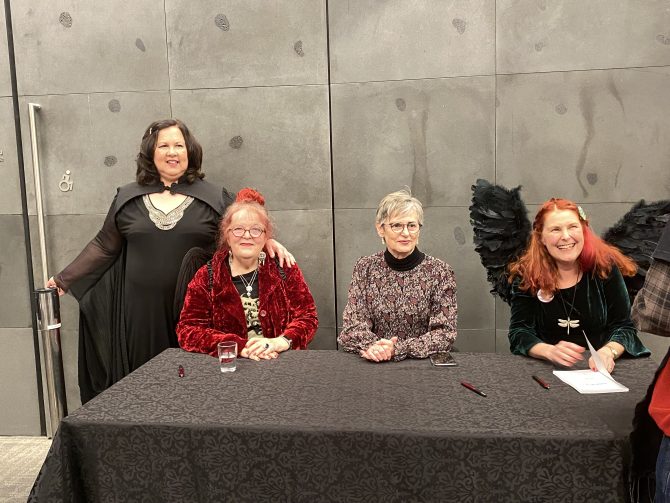
From left: Marisa Cappetta (Tender Insurrections), Jeni Curtis (stone men), Janet Wainscott (A Game of Swans) and Gail Ingram (Some Bird) at the book signing after the show.
Read the Sirens
A feminist collection of books about sirens and furies, inspired by myth and the lives women lead. These are personal recommendations from worldly women and poets Gail Ingram, Jeni Curtis, Janet Wainscott, Marisa Cappetta and Ockham prize winning Joanna Preston. Together they are Naming the Sirens, a chorus that is calling you, singing you, warning you, naming the joys, miseries and desires of women through time. Their debut performance is at WORD Christchurch 2023. Read their books and some of their inspirations compiled below.
Rata
Auahtanga, Tūranga
Find out more
- WORD Christchurch website and 2023 programme
- Our WORD Christchurch 2023 page
- Follow @WORDChCh on Twitter
- Follow WORDchch on Instagram
- Like WORD Christchurch on Facebook
- Listen to WORD Christchurch podcasts


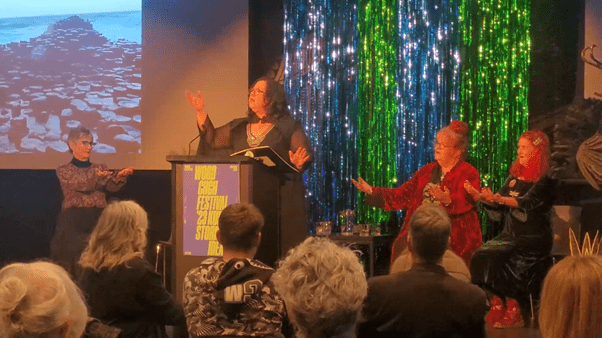

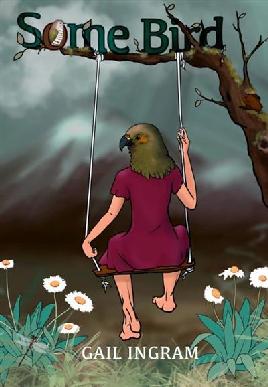
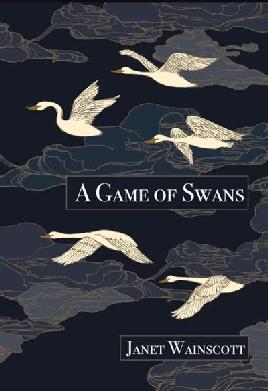
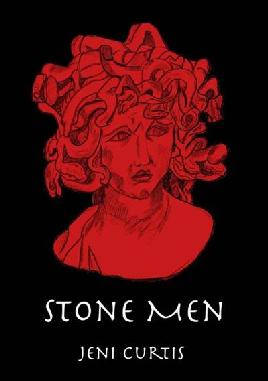

Add a comment to: WORD Christchurch 2023: An evening on the rocks with the Sirens